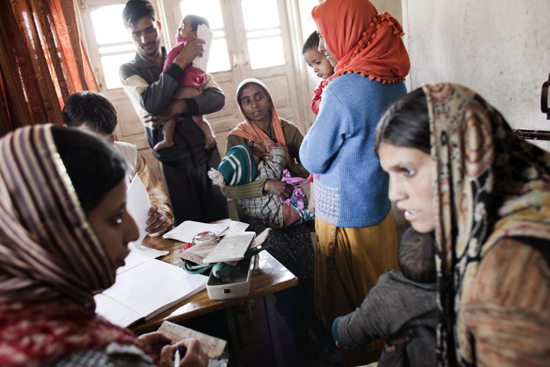
India 2010 © Giulio Di Sturco/VII Mentor
MSF staff perform mental health and medical consultations for residents in Kupwara, Kashmir, in April.
Doctors Without Borders/Médecins sans Frontières (MSF) has been able to resume some of its activities in Jammu and Kashmir after round-the-clock curfews and increasing violence led it to temporarily halt its mental health services on September 12.
Despite the continuing tense situation, MSF counselors have restarted visiting patients in the hospitals in the capital, Srinagar, and are offering on-the-spot psychological assistance to victims of violence and their families. With the cooperation of hospital staff, MSF has been able to treat more than 1,000 patients since this innovative mental health first-aid program was started earlier in the year. Since resuming its mental health services last week, MSF has provided counseling to 50 patients, the majority of whom have been traumatized by direct violence—mostly gunshot wounds.
“We’re dealing with a population already heavily traumatized by more than two decades of violence, and today people are continuing to suffer psychologically,” says Maria Veerart, MSF’s mental health officer in Kashmir. “MSF is extremely concerned that the recent violence will only further increase mental health needs in the Kashmir Valley.”
MSF has been providing a wide range of mental health services and basic healthcare in Kashmir since 2001, but due to the volatile situation it has been difficult to access those in need of mental health care who are confined to their homes because of curfews or fear of violence.
“In this context, MSF is forced to try and reach out to patients in new ways,” said Sasha Matthews, project coordinator for MSF in Srinagar. “We started telephone counseling so that we can follow up with our clients who are trapped at home and cannot access our services. Inspired by the success of the popular, long-running MSF radio show Alaw Baya Alaw, about mental health, we are currently working on a TV soap opera as a form of psychosocial education for Kashmiris.”
In 2009, MSF’s mental health program treated more than 5,800 people. In addition, MSF provided basic healthcare in seven clinics in Kupwara, conducting more than 20,500 consultations in 2009.




